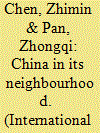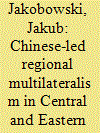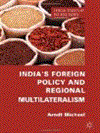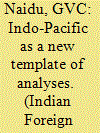|
|
|
Sort Order |
|
|
|
Items / Page
|
|
|
|
|
|
|
| Srl | Item |
| 1 |
ID:
109188


|
|
|
|
|
| Publication |
2011.
|
| Summary/Abstract |
China's regional policy is mainly centred on its efforts to forge a friendly, stable and prosperous neighbourhood. To achieve this end, China has developed an approach combining both partnership bilateralism and tailored regional multilateralism. By and large, China does not consider its neighbourhood as a whole and has been very cautious and hesitant to engage in overarching 'region-building'. China has relied mostly on soft (attractive) use of power, particularly economic power, supported by cultural and assurance diplomacy, even though diplomatic and economic coercion have been exercised occasionally. China has once again become the biggest economy in Asia. Yet, neither the new power configuration in Asia nor China's own ambitions point to a return to the old 'Middle Kingdom' with China holding a dominant position in its neighbourhood. China will most probably continue to see itself as a self-restrained regional power in the foreseeable future.
|
|
|
|
|
|
|
|
|
|
|
|
|
|
|
|
| 2 |
ID:
160831


|
|
|
|
|
| Summary/Abstract |
This article examines the network of Chinese-led regional platforms, established throughout the developing world in the twenty-first century. It seeks to identify the common features of Chinese-led regional multilateralism: its normative basis, institutionalization patterns and the scope of cooperation. A comparative study of three selected platforms established in Central and Eastern Europe (16 + 1), Africa (FOCAC), and Latin America (CCF) is provided. These comprehensive dialogue mechanisms are based on Chinese-backed norms of non-binding agreements, voluntarism and consensus, derived from the tradition of South–South cooperation. This translates into a flexible and loose institutional structure that enables China to combine multilateral and bilateral approaches, creating a highly adaptable blueprint for managing foreign relations on a regional scale. The article evaluates the outcomes of the Chinese-led regional model and discusses the implications of the findings for the understanding of China’s evolving foreign policy.
|
|
|
|
|
|
|
|
|
|
|
|
|
|
|
|
| 3 |
ID:
129807


|
|
|
|
|
| Edition |
1st ed.
|
| Publication |
Hampshire, Palgrave Macmillan, 2013.
|
| Description |
xiv, 225p.
|
| Standard Number |
9781137263117
|
|
|
|
|
|
|
|
|
|
|
|
Copies: C:1/I:0,R:0,Q:0
Circulation
| Accession# | Call# | Current Location | Status | Policy | Location |
| 057721 | 327.54/MIC 057721 | Main | On Shelf | General | |
|
|
|
|
| 4 |
ID:
135804


|
|
|
|
|
| Summary/Abstract |
The Indo-Pacific enormous scope for regional multilateralism to play a more important role than it has so far. Once it is recognized that economic cooperation, shared prosperity, and security challenges are no more sub-regional in nature but span the entire region, the Indo-Pacific will be better appreciated. Thus, the Indo-Pacific needs to be viewed in the larger perspective of offering more opportunities for cooperation than competition. Moreover, it is reflection of the rapidly changing geopolitical reference points. Thus, instead of looking at the Indo-Pacific idea with skepticism, it should be welcomed and promoted.
|
|
|
|
|
|
|
|
|
|
|
|
|
|
|
|
|
|
|
|
|